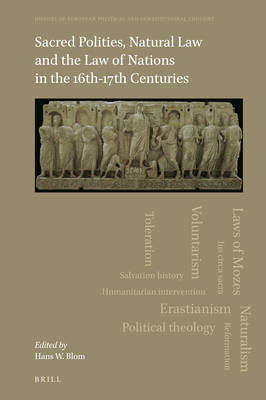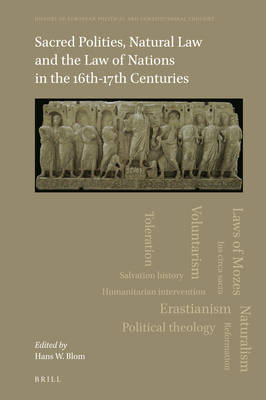
- Afhalen na 1 uur in een winkel met voorraad
- Gratis thuislevering in België vanaf € 30
- Ruim aanbod met 7 miljoen producten
- Afhalen na 1 uur in een winkel met voorraad
- Gratis thuislevering in België vanaf € 30
- Ruim aanbod met 7 miljoen producten
Zoeken
Sacred Polities, Natural Law and the Law of Nations in the 16th-17th Centuries
€ 244,45
+ 488 punten
Omschrijving
Often considered a secularizing force in the rise of the nation state, natural law was also invoked in defence of confessional states. The fourteen chapters in this volume show how religious and secularizing approaches to natural and biblical law interacted and combined as early modern states navigated the fallout from the Reformation. From this new perspective, the volume revisits questions of political legitimacy, civic and ecclesiastical authority, societal stability, conceptions of the common good, liberalism's value pluralism (and its pretence), toleration and the lingering humanist project of determining "who are we" - issues that were as important then as they are now.
Contributors are: Dominique Bauer, Thomas Behme, Hans Blom, Jiří Chotas, Alberto Clerici, Stefanie Ertz, Arthur Eyffinger, Heikki Haara, Mads Langballe Jensen, Adriana Luna-Fabritius, Denis Ramelet, József Simon, and Markus M. Totzeck.
Contributors are: Dominique Bauer, Thomas Behme, Hans Blom, Jiří Chotas, Alberto Clerici, Stefanie Ertz, Arthur Eyffinger, Heikki Haara, Mads Langballe Jensen, Adriana Luna-Fabritius, Denis Ramelet, József Simon, and Markus M. Totzeck.
Specificaties
Betrokkenen
- Uitgeverij:
Inhoud
- Aantal bladzijden:
- 364
- Taal:
- Engels
- Reeks:
- Reeksnummer:
- nr. 7
Eigenschappen
- Productcode (EAN):
- 9789004498532
- Verschijningsdatum:
- 13/01/2022
- Uitvoering:
- Hardcover
- Formaat:
- Genaaid
- Afmetingen:
- 156 mm x 232 mm
- Gewicht:
- 884 g

Alleen bij Standaard Boekhandel
+ 488 punten op je klantenkaart van Standaard Boekhandel
Beoordelingen
We publiceren alleen reviews die voldoen aan de voorwaarden voor reviews. Bekijk onze voorwaarden voor reviews.






